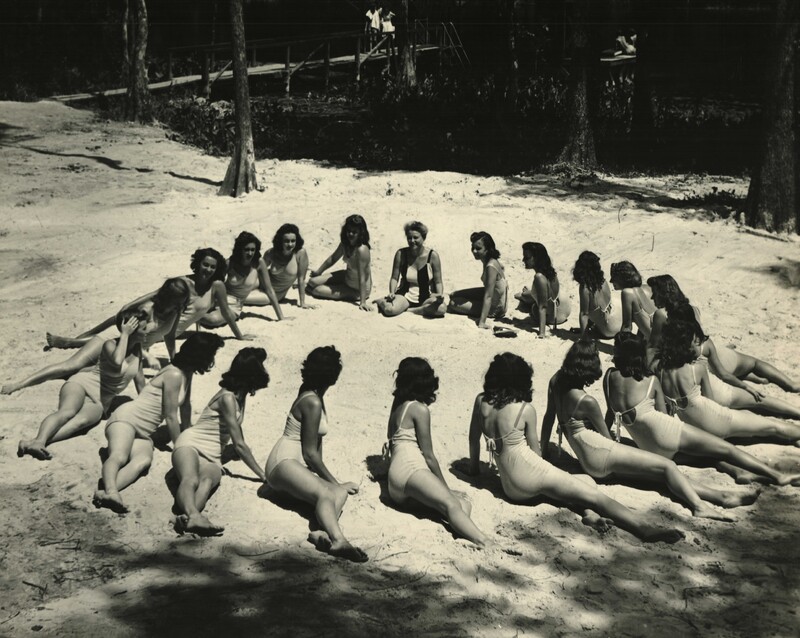Weeki Wachee Mermaids Sitting in a Circle
Dublin Core
Title
Weeki Wachee Mermaids Sitting in a Circle
Alternative Title
20 Weeki Wachee Mermaids Sitting in a Large Circle
Subject
Weeki Wachee Springs (Fla.)
Tourism--Florida
Springs--Florida
Parks--Florida
Mermaids--Florida
Perry, Newton, 1908-1987
Description
20 Weeki Wachee mermaids posing for a photograph by sitting in a large circle. The photograph was taken sometime in the 1950s.
Newton "Newt" Perry was born in Valdosta, Georgia in 1908, and moved with his family to Ocala, Florida in 1922. He was a member of the swimming and diving teams at the University of Florida. Perry earned the nickname "The Human Fish" for his performances of underwater stunts in advertising clips and film shorts, and acted as a swim double for actors in movies and TV shows, including Johnny Weissmuller as "Tarzan." Perry also advised filmmakers filming underwater scenes at Silver Springs, Wakulla Springs, and Weeki Wachee Springs, and developed a system for breathing underwater using an air compressor and hose, which was used in the 1948 film "Mr. Peabody and the Mermaid" and during Weeki Wachee Springs' mermaid shows.
Perry worked as a lifeguard, public school principal, coach, swimming and scuba diving instructor, and Ocala city pool manager. He opened Perry's Swim School in 1955, and taught more than 120,000 individuals to swim during his career. Perry was inducted into the Florida Sports Hall of Fame in 1981. Perry's daughter Delee Perry took over Perry's Swim School following her father's death in 1987, and it was still in operation as of 2020.
Along with a group of investors, Newton Perry opened Weeki Wachee Springs to the public in October of 1947, and used his experiences working at Silver Springs and Wakulla Springs to develop the original concepts for its underwater theater and mermaid shows. Perry sold his stake in Weeki Wachee Springs in 1950. After peaking in the 1950s and 1960s, attendance began to decline as theme parks and highways changed the dynamics of Florida's tourism. The State of Florida took over the attraction as a state park in 2008. Since then, the park has focused on appealing to a modern audience while preserving its history.
Newton "Newt" Perry was born in Valdosta, Georgia in 1908, and moved with his family to Ocala, Florida in 1922. He was a member of the swimming and diving teams at the University of Florida. Perry earned the nickname "The Human Fish" for his performances of underwater stunts in advertising clips and film shorts, and acted as a swim double for actors in movies and TV shows, including Johnny Weissmuller as "Tarzan." Perry also advised filmmakers filming underwater scenes at Silver Springs, Wakulla Springs, and Weeki Wachee Springs, and developed a system for breathing underwater using an air compressor and hose, which was used in the 1948 film "Mr. Peabody and the Mermaid" and during Weeki Wachee Springs' mermaid shows.
Perry worked as a lifeguard, public school principal, coach, swimming and scuba diving instructor, and Ocala city pool manager. He opened Perry's Swim School in 1955, and taught more than 120,000 individuals to swim during his career. Perry was inducted into the Florida Sports Hall of Fame in 1981. Perry's daughter Delee Perry took over Perry's Swim School following her father's death in 1987, and it was still in operation as of 2020.
Along with a group of investors, Newton Perry opened Weeki Wachee Springs to the public in October of 1947, and used his experiences working at Silver Springs and Wakulla Springs to develop the original concepts for its underwater theater and mermaid shows. Perry sold his stake in Weeki Wachee Springs in 1950. After peaking in the 1950s and 1960s, attendance began to decline as theme parks and highways changed the dynamics of Florida's tourism. The State of Florida took over the attraction as a state park in 2008. Since then, the park has focused on appealing to a modern audience while preserving its history.
Source
Original photograph of underwater theater at Weeki Wachee Springs State Park: Personal Collection of Delee Perry.
Publisher
Date Created
c. 1950s
Date Copyrighted
c. 1950s
Date Issued
c. 1950s
Is Format Of
Digital reproduction of original photograph of Weeki Wachee Mermaids.
Is Part Of
Weeki Wachee Collection, RICHES.
Format
image/jpg
Extent
4.89 MB
Type
Still Image
Coverage
Weeki Wachee Springs State Park, Spring Hill, Florida
Accrual Method
Donation
Mediator
History Teacher
Humanities Teacher
Theater Teacher
Visual Arts Teacher
Provenance
Originally created by Newton "Newt" Perry, owned by Delee Perry, and published by RICHES.
Rights Holder
Copyright to this resource is held by Delee Perry and is provided here by RICHES for educational purposes only.
Contributing Project
Florida Humanities Council Community Grant Program and Friends of Weeki Wachee Springs State Park
Curator
Schwandt, Rebecca
Digital Collection
Source Repository
Personal Collection of Delee Perry
External Reference
Allman, T.D. Finding Florida: The True History of the Sunshine State. New York: Atlantic Monthly Press, 2013.
Ammidown, Margot. “Edens, Underworlds, and Shrines: Florida’s Small Tourist Attractions.” The Journal of Decorative and Propaganda Arts 23, (1998): 238-259.
Georgiadis, Bonnie and Lu Vickers. Weeki Wachee Mermaids. Gainesville: University Press of Florida, 2012.
Hollis, Tim. Glass Bottom Boats and Mermaid Tails: Florida’s Tourist Springs. Mechanicsburg: Stackpole Books, 2006.
Pelland, Dan and Maryan Pelland. Images of America: Weeki Wachee. Mount Pleasant: Arcadia Publishing, 2006.
Revels, Tracy J. Sunshine Paradise: A History of Florida Tourism. Gainesville: University Press of Florida, 2011
Vickers, Lu. Weeki Wachee City of Mermaids: A History of One of Florida’s Oldest Roadside Attractions. Gainesville: University Press of Florida, 2007.
Collection
Citation
“Weeki Wachee Mermaids Sitting in a Circle,” RICHES, accessed March 5, 2026, https://richesmi.cah.ucf.edu/omeka/items/show/11197.
